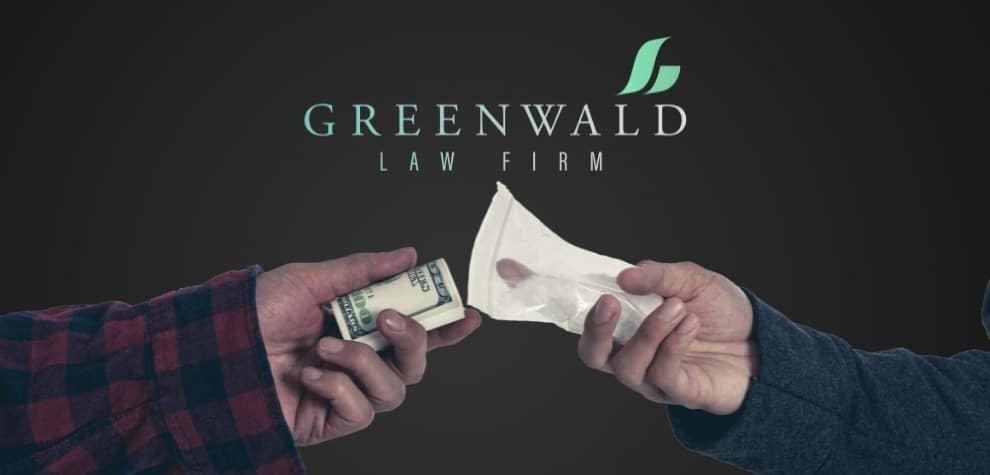There is often plenty of confusion that surrounds the criminal charge of drug trafficking. This is likely because most people have a predisposed mental picture in their heads of what drug trafficking looks like. It is not uncommon for someone to associate drug trafficking with what they see on movies and TV, such as Breaking Bad or Narcos. However, drug trafficking charges aren’t only reserved for high-end, cartel-affiliated operations. Sometimes, simply having a certain amount of an illegal substance on you at any given time is considered trafficking and can warrant a charge.
In this post, Shreveport attorney Joey Greenwald can help you answer the question “What is drug trafficking?” and more. If you or a loved one has been charged with a drug-related crime, time is of the essence. Reach out to the Greenwald Law Firm ASAP to get to work on your defense.
Drug Trafficking Definition
Legally, drug trafficking refers to the illegal provision of drugs to the public for their consumption. This encompasses all aspects of drug trade, including the growing, processing, distributing, and selling of illicit drugs.
However, to receive a drug trafficking charge in Louisiana, as well as in many other states, you don’t actually need to be selling the drug. In the grand scheme of things, drug trafficking charges are essentially possession cases that involve a very sizeable amount of drugs. This means that as long as you meet a certain threshold, whether you intend to use it for personal use or not doesn’t matter. The amount of drugs that a person must be found in possession of varies depending on the illicit substance.
Common types of drug trafficking charges in Louisiana include those involving marijuana, cocaine, heroin, methamphetamine, MDMA, LSD, and various prescription drugs.
What Amount of Drugs is Considered Trafficking?
The amount of drugs you are caught with makes all the difference in a drug-related charge. It could very well mean the difference between a simple possession charge and a trafficking charge. Every state has its own guidelines for the drug amount threshold that determines the severity of the charge and its penalty.
Even once you already reach the threshold for trafficking, the more illegal substances you are found in possession of, the harsher your drug trafficking penalty will be. To learn what both federal and state law consider to be a threshold amount for trafficking, call Joey Greenwald at 318-219-7867 today.
What is the Average Sentence for Drug Trafficking?
Drug trafficking charges can be prosecuted on both state and federal levels. Prosecution on the federal level will result in harsher penalties than those on the state level. The level at which they prosecute will play a huge role in the penalties and sentences you receive.
Louisiana state law governs trafficking that occurs within state lines. To receive a federal charge, the case must cross over into federal jurisdiction. This could mean that the trafficking involves the crossing of state lines, tax evasion, or a pattern of racketeering.
Another thing that comes into play when determining a sentence for drug trafficking charges is the type of drug in question. Louisiana categorizes drugs into different schedules, ranging from Schedule I to Schedule V. Schedule I drugs are the most threatening, as they pose the highest risk for abuse and potential harm. This schedule includes substances such as heroin, LSD, and ecstasy. Schedule V, on the other hand, is the least threatening due to the fact that it poses the least danger and has the lowest potential for abuse. Schedule V drugs include things like Robitussin AC and other mild pain-managing narcotics.
So, you can expect a much harsher sentence for the trafficking of drugs in Schedules I and II than you might in IV or V. If you have prior convictions for drug-related crimes or a criminal history in general, this factor will likely increase the punishment as well.
With all things considered, there is no “average” sentence for drug trafficking. A conviction could result in a prison term of several years to several decades, often including steep fines. Prosecutors may also attempt to seize your property and assets. Overall, there are many things that a judge must take into account before determining your individual sentence.
Can I Fight a Drug Trafficking Offense in Louisiana?
While a drug trafficking offense can be difficult to beat, it is certainly not impossible. This is especially true when you receive help from a skilled and experienced drug offense attorney like Joey Greenwald.
At the Greenwald Law Firm, we determine a unique defense strategy based on the details of each individual case. We will investigate every aspect of your case to uncover any information that may help us build up your defense.
Some of the successful defense strategies we often use include the following:
- Substance not knowingly possessed
- Illegal search
- Consent to search was under duress
- Stop and seizure of your person or car was illegal
- Mistaken ownership
- Search warrant not applied for or obtained properly
- Substance in question not the substance alleged
- Inaccurate or mistaken facts
Contact Greenwald Law Firm For Your Drug Trafficking Defense Today
Considering the complexity of the case and the severity of the consequences, it’s crucial that you obtain the help of a skilled Shreveport criminal defense attorney. You need a seasoned, dedicated defense lawyer who will fight for you in the county, juvenile, or federal court system. That is exactly what you’ll find here at Greenwald Law Firm. Attorney Joseph Greenwald, Jr. is prepared to protect your constitutional rights and ensure you receive a fair trial at all costs.
Call us at 318-219-7867 anytime, seven days a week, and at any hour of the day or night to schedule your free initial consultation. We also accept collect calls from the jail.

